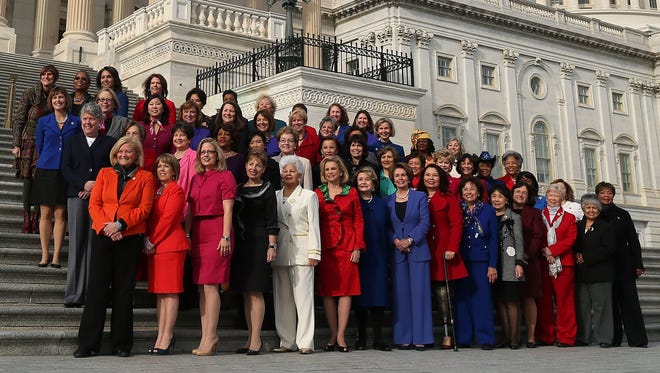Record number of women in Congress out to change tone

- There are 98 women in the 113th Congress, not including non-voting delegates
- Women in Congress say they bring different life experiences to the job
- Several women in Congress are leaders of high-profile committees
WASHINGTON — When Rep. Marcy Kaptur first came to Congress in 1983, the Ohio Democrat was one of only 24 women in the House and Senate.
Thursday, she became part of history when a record 98 women — 20 in the Senate and 78 in the House — took their place in the new 113th Congress. Though they are not a majority, women serving in Congress and experts who have watched the rise in political power of women say they can make a difference.
"Women bring a breadth of experience that will be important to the work of every committee," said Kaptur, who is dean of women in the House. "They bring life experience and perceptions that have been missing here. I hope the operations of Congress will change and be more productive and less contentious."
The last Congress was notable for its lack of productivity and its rancor. Job approval ratings for the 112th Congress reached record lows, in the single digits of Gallup and other public opinion polls.
There was a fresh start Thursday, and women are in position to make an impact.
In the Democratic-controlled Senate, Maryland's Barbara Mikulski is the first woman to wield the chairman's gavel at the Appropriations Committee, which allocates federal spending for nearly all programs. Washington Sen. Patty Murray leads the Budget Committee and California's Dianne Feinstein heads up the Intelligence Committee. Michigan's Debbie Stabenow leads the Agriculture Committee, California's Barbara Boxer is chair of the Environment Committee and Louisiana's Mary Landrieu is in charge at the Small Business Committee.
On the House side, where Republicans are in power, Rep. Cathy McMorris Rodgers of Washington holds the fourth-highest position in the GOP leadership, as chairwoman of the House Republican Conference. There are no Republican women in charge of high-profile committees, but Rep. Candice Miller of Michigan is chairwoman of the House Administration Committee, which deals with such issues as office budgets and technology of members.
Newly sworn-in Rep. Jackie Walorski, R-Ind., said she's not bothered by low approval ratings for Congress or the fact that new members have major issues such as spending cuts to tackle right away.
"This is the people's business, and the people's business never stops. It's a 24-7 endeavor," Walorksi said. "I ran to be a part of the solutions."
In her remarks on the House floor, Minority Leader Nancy Pelosi suggested ways Congress could increase the number of women and boost overall diversity in the chamber.
"We must increase the level of civility and reduce the role of money in our elections," said Pelosi, D-Calif.
Ruth Mandel, the founder of the Center for American Women and Politics and director of the Eagleton Institute of Politics at Rutgers University, cautions that the presence of women alone won't change Congress by itself.
But she said their ranks could make a difference on issues such as the Violence Against Women Act, a law first crafted by Vice President Biden when he was a senator in 1994. The law, which deals with the prosecution and investigation of domestic and sexual abuse, was renewed without fanfare in 2000 and 2005 but ran into opposition last year in the House.
"I can't say because the women are there that we won't go over the next fiscal cliff," Mandel said. "But women have a historic opportunity to become a formidable force for no-nonsense problem solving and leadership."
Contributing: Maureen Groppe, Gannett Washington Bureau